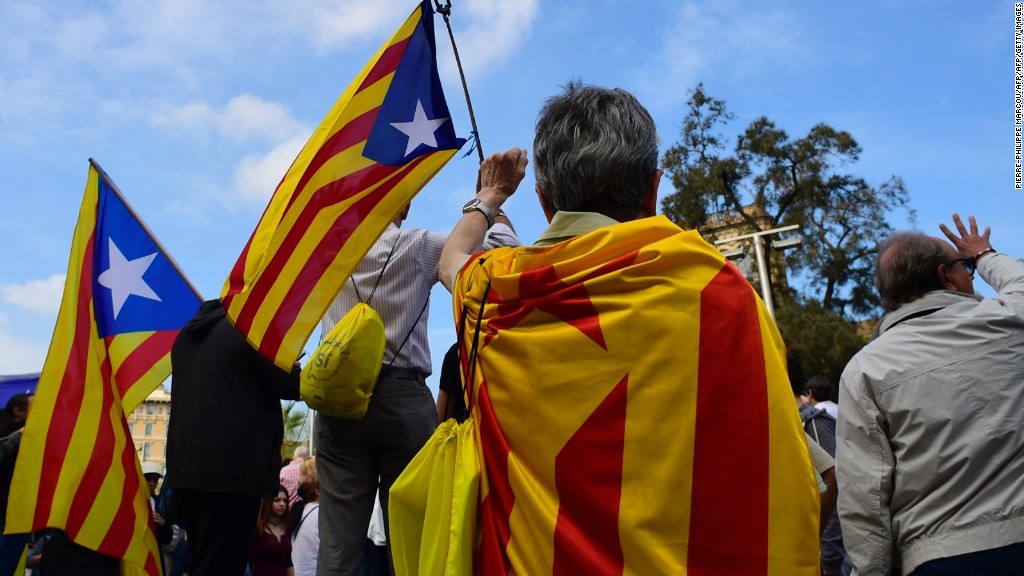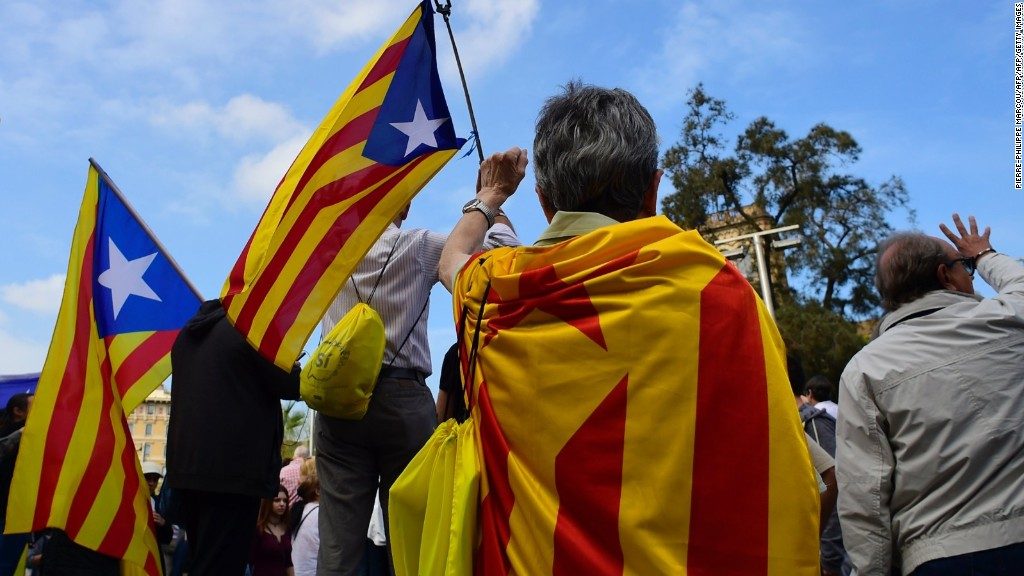An election in Catalonia Dec. 21 gives voters another chance to express their view on whether the region should press ahead with its fight to break away or remain within Spain.
The vote was called in October, when Spanish Prime Minister Mariano Rajoy fired the Catalan government and dissolved the regional parliament in a bid to snuff out the secession movement. With ousted Regional President Carles Puigdemont in self-imposed exile in Brussels, the ballot may do little to settle the bitter division over Catalonia’s bid for independence — and Rajoy’s efforts to stop it.

1. Will The Election Resolve The Secession Question?
Probably not. Neither side is likely to win a resounding mandate in the vote, which will fill all 135 seats in the regional parliament, according to final polls before a blackout period began Dec. 16. The coalition of parties that support independence may struggle to repeat their 2015 election performance, when they were able to cobble together a government. At the same time, the surveys show parties led by Ciudadanos, who favor unity with Spain, are also short of the votes they need to win the election. As the electoral math stacks up now, it looks like the three-century-old dispute over Catalonia’s identity will continue to smolder.
The Dec. 21 vote triggers a precisely choreographed chain of events laid out under Spanish electoral law. The next regional parliament has to be constituted by Jan. 23 and hold an investiture vote by Feb. 8. If the assembly hasn’t chosen a president 54 days later — a distinct possibility, given the latest opinion polls — it is dissolved and new elections are called.
3. So Who Is Running Catalonia At The Moment?
Rajoy and his Madrid-based national government remain in charge until there’s a new government. Rajoy invoked emergency powers under article 155 of Spain’s constitution and he has said he’d be willing to deploy them again if necessary. Rajoy’s move in October drew a line in the sand: Should a pro-independence government emerge from the elections and openly challenge Spain’s constitutional order, he may disband it again.
It’s not clear, given the disparate makeup of the forces that have made up the pro-secession platform in the past. Esquerra, the biggest pro-secession party, says that the time for symbolic declarations of independence is over. Its secretary general, Marta Rovira, has said that if a pro-independence government emerges from the vote, it would demand talks with Spain and reach out to foreign governments as it explores a way forward for Catalonia. The left-wing radicals of CUP, whose 10 seats enabled the pro-secession bloc to seal a majority in 2015, are still insisting on a unilateral declaration of independence.
5. What Are Some Possible Next Acts In This Drama?
Nothing better sums up the bizarre nature of the drama than Puigdemont’s self-exile in Brussels, where he continues to claim he’s the rightful president of Catalonia. If he returns to Spain, he faces arrest. Then there’s the spectacle of Esquerra chief Oriol Junqueras who is running for election while being held in jail pending a probe into the alleged “rebellion” by the pro-independence leadership against Spain. A clear victory for pro-independence forces would make it harder for Rajoy to defend his stance the constitution invalidates the demands for secession. Watch for political noise building across Europe if that happens, though so far the European Union has soundly backed Rajoy.
6. What’s The Way Out Of This Mess?
It’s complicated. Dialogue and a reform of Spain’s system of government might appear to offer a way forward but it was never going to be that straightforward. Rajoy has said won’t agree to any step — such as allowing Catalans to vote on independence in a referendum — that goes against the 1978 Constitution. The appropriate place for Catalans to voice their demands is — according to him — the Spanish parliament, which, unsurprisingly, is overwhelmingly in favor of keeping the country whole.
7. Why won’t Spain offer Catalonia more autonomy?
It’s tricky to devolve more powers to Catalonia, which makes up about a fifth of Spain’s economy. For instance, granting the regional government powers to raise its own taxes risks upsetting the delicate equilibrium of constitutional powers and may lead to other regions demanding the same privileges. For now, the most striking suggestions have come from the Catalan Socialist candidate Miquel Iceta, who has called for pardons for independence leaders who end up in jail and for the government to grant the region some debt relief. His party, though, is running fourth in opinion polls.
8. What should investors watch?
Even if there’s electoral deadlock, Catalonia still needs a government. Watch out for the role played by Catalunya en Comu, a Catalan ally of the anti-establishment party Podemos — in theory it may determine whether the separatist bloc gets another chance to form a government. Tensions are running high in Catalonia and in Spain more widely. Any open defiance of public order — and the Spanish state’s response — would generate headlines.
The Catalonia crisis has also caused wider political problems for Rajoy by straining his relations with the Basque deputies he relies on to pass legislation. Investors should also watch any impact on the economy. The Bank of Spain has just trimmed its growth estimates for 2018 and 2019, citing the impact of the Catalan crisis.

